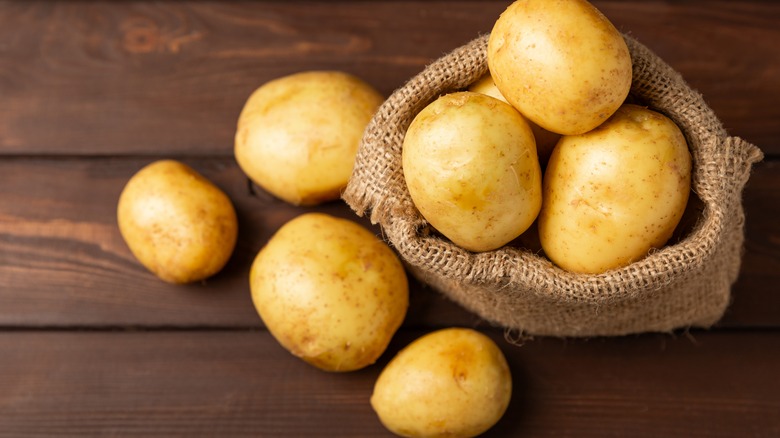Most Vodka Isn't Actually Made From Potatoes
Vodka has ranked as the most popular liquor in the U.S. for over 50 years (via Insider Monkey), but despite its ubiquity on bar menus, few people know what it's actually made of. If you asked the average person what vodka's main ingredient is, they would most likely say potatoes, but this isn't true — in fact, it's not even close. Most vodka today is actually made from grains, commonly wheat or corn.
If you look at the most popular vodka brands, you'll find that none of the big-name producers actually use potatoes. Wheat is the most common choice, used by Grey Goose, Absolut, Ketel One, Svedka, and many more. Tito's and Smirnoff, the two best-selling vodka brands in the U.S., both use corn. Some brands use a mix of the two, and a few use ingredients you'd probably never expect; Cîroc, for instance, uses grapes.
The reality is that you can make vodka out of almost any ingredient, as long as that ingredient contains some sugar or starch to ferment. This contrasts with other liquors, which are typically bound to a strict set of ingredients. Bourbon, for example, must use corn as its primary ingredient, while tequila is even more restricted, requiring a specific variety of agave. Vodka, on the other hand, isn't defined by its ingredients, but rather by the process used to make it.
How vodka is made
The vodka-making process begins by combining a base ingredient — such as wheat, corn, or potatoes — with water and yeast. The yeast reacts with the sugars and starches present in the base ingredient, fermenting the mixture until it forms ethanol (alcohol). Once the mixture is fully fermented, it's ready to be distilled. This is the most crucial part of vodka production and the step that truly sets it apart from other alcohols.
Distillation is a purification process that heats the vodka until it evaporates, then captures the resulting vapor before cooling it down to a liquid state once more. This process removes impurities in the mixture. All forms of liquor are distilled, but vodka is distilled more than others. Most vodka producers distill their product between three and seven times, some even more than that. For comparison, spirits like bourbon and rum are typically just distilled twice.
The more times a spirit is distilled, the clearer and smoother it becomes. That's why vodka goes with so many mixers — it's clear, colorless, and virtually flavorless, earning its reputation as the ultimate neutral spirit. More distillation also equals a higher alcohol content. For a liquor to officially count as vodka, it must be distilled to a whopping 95% alcohol by volume (ABV), but it's then diluted with water to bring it down to the range of 40-46% ABV. This factor is the true defining feature of vodka, not the ingredients themselves.
Why do we associate vodka with potatoes?
The fact that a vast majority of vodka is made from wheat or corn begs the question of how this spirit ever became associated with potatoes. To understand that, we need to look at the spirit's history, which began in either Russia or Poland (both nations claim to be the origin point). Recorded mentions of vodka date back to the 14th century, but potatoes, which are native to South America, weren't introduced to Europe until the 16th century. Before that, vodka was made from grapes and was essentially distilled wine.
Potatoes became especially associated with Eastern Europe during the Soviet era, which was marked by a series of severe famines in which many had to rely on potatoes for survival. During this period, potatoes were the easiest source for vodka. That's no longer the case, but potatoes remain a major Russian stereotype. While Russia isn't the country that grows the most potatoes (that honor actually goes to China), it is high on that list, and the American perception of Russians eating lots of potatoes no doubt played a key role in the assumption that vodka must be made from them.
Ironically, potatoes are actually one of the least efficient sources for vodka, as they take more time and effort to ferment than grains do. This is because the starches in potatoes are more complex than those in wheat or corn.


